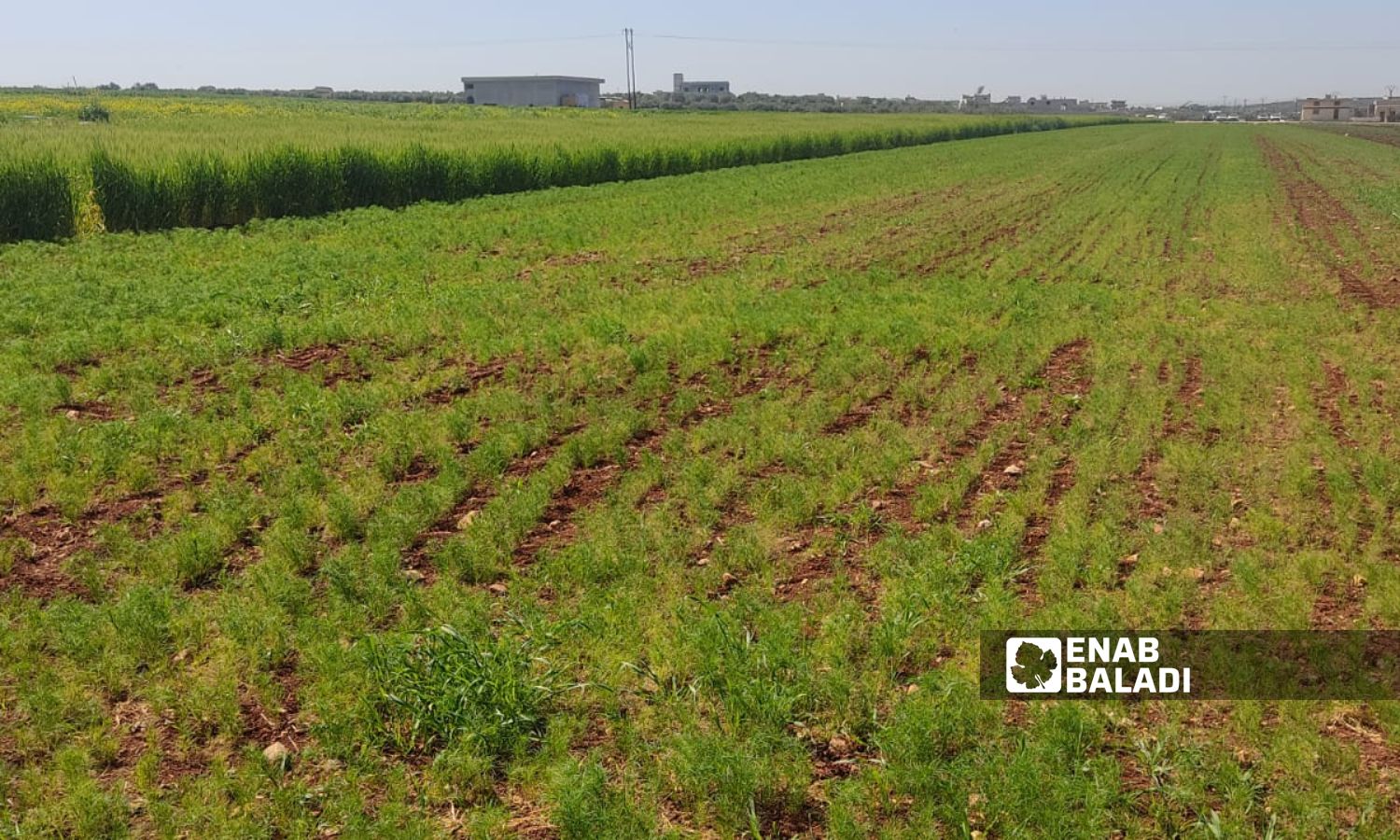



Enab Baladi – Idlib
The year 2024 has seen an influx of farmers in Idlib opting to cultivate cumin, seeking greater financial returns than from traditional crops such as wheat and barley, driven by its high price despite the risks associated with its cultivation, similar to other aromatic plants in the region.
Cumin cultivation has recorded unprecedented figures, with the planted area reaching an estimated 4350 hectares in Idlib and its countryside, areas under the control of the Syrian Salvation Government (SSG), according to statistics obtained by Enab Baladi from the Directorate of Agriculture.
Cumin is a winter plant, with its cultivation in various parts of Syria beginning between mid-November and mid-January. Planting may extend until early February depending on the region’s weather and sufficient rainfall.
Farmer Mohammed al-Taleb planted 170 dunams of cumin in the Idlib countryside this year, telling Enab Baladi that he cultivated cumin on this scale for the first time, having planted less in previous years in the hope of achieving a good financial return.
He mentioned that cumin selling prices are high, making it the only crop that can financially uplift farmers, despite fears of unsuccessful cultivation and poor yield.
The farmer also explained that costs vary depending on whether the land is owned or rented; a hectare costs $700 for the landowner, while a tenant farmer faces costs of about $1500 per hectare, which includes the expenses of seeds, fertilizers, insecticides, labor, irrigation, and more.
In the 2023 season, cumin prices in Idlib ranged from $4200 to $6800 per ton, while the Salvation Government’s Ministry of Agriculture set the wheat purchasing price from farmers at $320 per ton for the year 2023. The price was set at $450 per ton in 2022.
Agricultural engineer Anas Abu Tarboush told Enab Baladi that cumin cultivation was very minimal before 2010, and since then, the areas planted with the crop in Idlib have gradually increased.
He noted that cumin cultivation brings positives for farmers, including increased income and profit, consequently raising their standard of living, as it is a crop that commands a high price compared to traditional crops like wheat and barley.
He added that growing cumin diversifies the agricultural cycle and prevents it from being limited to wheat and barley. He pointed out that while studies have not yet proven that this plant benefits the soil, it is considered very exhausting for the soil if its cultivation is repeated over several years.
Abu Tarboush also mentioned that fungi could infect the plant’s roots and threaten the harvest, potentially destroying it, and that repeated planting decreases production.
The engineer highlighted that increasing the cumin planted area at the expense of strategic crops like wheat negatively affects and threatens a food crisis over the years, as cumin is used in spice production and is not essential to human nutrition like wheat.
Tamam al-Hamoud, director of the Directorate of Agriculture in the Salvation Government in Idlib, told Enab Baladi that cumin cultivation on such a scale and its increase negatively impacts because it has been planted at the expense of wheat, and farmers have turned to it due to its good economic income.
Over the past three years, new and non-traditional crops have entered northern Syria, breaking the mold of the usual farming practices of local farmers, in pursuit of higher returns amid poor economic and living conditions.
These crops are considered “exotic” to the soil of northwestern Syria, some brought by displaced individuals or planted by locals and have evolved from being home garden plants to principal crops on extensive lands.
The cultivation of Damask rose has become vigorous in the north, transferred by displaced individuals who were accustomed to rose cultivation in regime-controlled areas, especially in the countryside of Damascus.
Some of the latest crops introduced in the north include saffron, sage, rosemary, and other medicinal aromatic plants.
Farmers in northern Syria face organizational problems, a lack of financial capabilities, and the use of agricultural machinery, in addition to the high prices of fuel used in operating equipment and transport vehicles.
In the case of plastic tunnel farming, farmers encounter even greater difficulties as it is “sensitive” and requires specific care and environmental conditions.
Enab Baladi’s correspondent in Idlib, Iyad Abdul Jawad, contributed to this report.
if you think the article contain wrong information or you have additional details Send Correction